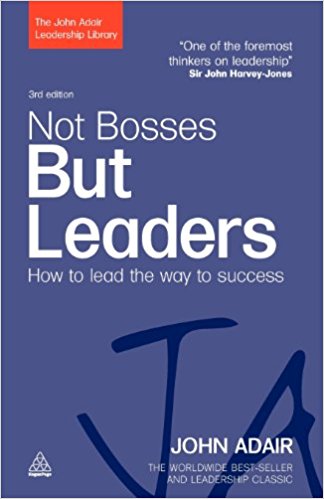Not Bosses But Leaders Summary

4 min read ⌚
 How to Lead the Way to Success
How to Lead the Way to Success
If you think that leadership is about bossing around – you’re ignoring most of human history. Military general didn’t boss around – but led men. And that’s why you need to lead men too. John Adair says: “Not Bosses But Leaders.”
And we say: “Aye, aye, sir!”.
About John Adair
John Eric Adair is a British author, one of the leading authorities on leadership in the world, and possibly the foremost in Europe. He has both a military and an academic background and is the President of Adair International. Some of his more famous books are: “The Inspirational Leader,” “The Leadership of Muhammad,” “The Leadership of Jesus,” and his “100 Greatest Ideas” series.
is a British author, one of the leading authorities on leadership in the world, and possibly the foremost in Europe. He has both a military and an academic background and is the President of Adair International. Some of his more famous books are: “The Inspirational Leader,” “The Leadership of Muhammad,” “The Leadership of Jesus,” and his “100 Greatest Ideas” series.
Read more at http://www.johnadair.co.uk/.
“Not Bosses But Leaders Summary”
It’s always a good idea to learn from history. Otherwise – they say – you’re bound to repeat it.
Fortunately, when it comes down to being a leader, there are many great historical figures you can learn from. Most of them were military geniuses, so it’s great when you have someone with both martial and academic background like John Eric Adair to tell you what you can take away from their careers. And prepare for you a nice, structured list of time-tested irrefutable leadership rules.
However, don’t expect anything original! Because, even though “Not Bosses But Leaders” is fairly unique in its inspirations and models, its conclusions are pretty much commonsense. Which, we guess, speaks volumes about the timelessness of what it really means being a leader – whether on the battlefield or as the head of your company.
Because in both cases, you need to have integrity, enthusiasm, warmth, calmness, toughness, and fairness. And, of course, a good understanding of the situation. Because even Winston Churchill was a good war leader, but a bad one in peacetime.
And, in order to understand in which ways your leadership is needed, you have to always take Maslow’s hierarchy of human needs into consideration. Employing it in your business works wonders. And there are leaders who can testify to this.
The great leaders are always aware of their functions. They are good at identifying objectives and developing plans. However, they also know how to communicate these plans to their employees and how to organize the teams best equipped to execute them. Finally, they are good at evaluating and finding out the real reasons behind the problems.
This is of utmost importance. Because when a task is not completed in the expected way, a good leader doesn’t start blaming people around. He holds them accountable. But, only after holding himself accountable first. Because, the task may have simply been improperly related to the employees.
“A wise leader,” writes Adair, “will know that he or she needs correcting on occasions.”
And it is only in this way that he would be able to set the right standards and become a paragon of behavior. And once that happens, everybody in the company will start believing him and following him out of respect.
Key Lessons from “Not Bosses But Leaders”
1. Don’t Be a Gekko: Be a Hannibal
2. Different Situations Call for Different Leaders
3. Learn How to Use Maslow’s Hierarchy of Needs to Become a Better Leader
Don’t Be a Gekko: Be a Hannibal
“The reason why leadership has military undertones,” writes Adair, “is that there has been a long tradition of military commanders seeing the essence of their job as leading men.” And your job as a CEO is exactly that: you should be leading men as well.
And oftentimes the world of business is as difficult terrain as the Alps, so you better learn how to be a Hannibal. Because, not only taking short cuts doesn’t pay off – it’s frequently not even an option!
Different Situations Call for Different Leaders
Which brings us to one of the most important lessons of this, or any other, leadership book. Namely, that there’s not one universal leadership style. You need to be one kind of a leader in war, but a completely different one in peacetime.
People themselves know this subconsciously, so they didn’t vote for Winston Churchill after the war – even though he saved the British Empire during it!
Learn How to Use Maslow’s Hierarchy of Needs to Become a Better Leader
The best leaders are the ones who know the needs of their employees best. And where can you find a better illustration of any individual’s needs if not in Abraham Maslow’s pyramid of motivation. And according to him, there is a general pattern.
The most basic human need is physiological (food, drink, sleep). Then, there’s the need for safety. Thirdly, it’s the love/belonging stage, followed by self-esteem and self-actualization. As a leader, you need to be learn how to offer an employee a path to self-actualization, by giving him or her an opportunity to satisfy each of these needs sequentially.
Like this summary? We’d Like to invite you to download our free 12 min app, for more amazing summaries and audiobooks.
“Not Bosses But Leaders” Quotes
Great necessities call forth great leaders. Share on X Management that ignores or resists change will never inspire others. Share on X Authority flows from the one who knows. Share on X Leadership is action, not position. Share on X Never tell people how to do things; tell them what to do and they will surprise you with their ingenuity. Share on X







